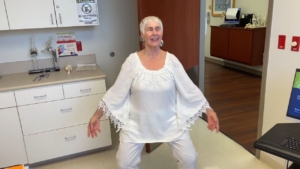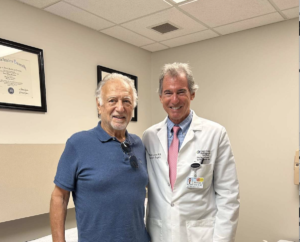What’s Your Hip IQ?
(Second of a three-part series)
This is the second “quiz” in a three-part series designed to test your knowledge. Our hope is to inform, educate and give you confidence with proceeding to have a total hip replacement. At the Leone Center we repeatedly see that patients who go into surgery more prepared and more knowledgeable have a better experience and get well faster.
There are 7 TRUE or FALSE questions followed by expanded answers.
On our website (holycrossleonecenter.com) you can download our helpful booklet “Preparing For Your Hip Replacement” filled with step-by-step information
We are a concierge practice with a personalized approach that begins with the first phone call and continues throughout your care. No crowded waiting rooms and rushed meetings with Dr. Leone or his entire team. We model our care according to the way we would want our own families to be treated and that means that only the best will do.
True or False?
- With the modern techniques used by anesthesiologists, including shorter-acting and more specific medicines, regional anesthesia and blocks, many complications people frequently experienced after surgical anesthesia are being avoided.
- A multimodal approach to pain management often includes a spinal anesthetic, local pain blocks as well as a “cocktail” of different medications to stay ahead of the pain curve by decreasing and preventing pain.
- Before your hip replacement, you may feel pain in your groin, back, thigh or knee.
- Despite the anesthesia, you will have pain after surgery.
- Many patients go home several hours after hip replacement surgery.
- Most people need physical therapy either at home or in a rehab facility to strengthen their limbs after joint replacement surgery.
- The amount of physical therapy you require after surgery depends in large part on how physically fit you were before surgery.

Answers:
(8-14) True, True, True, True, True, True, True
- TRUE: With the modern techniques used by our anesthesiologists, including shorter-acting and more specific medicines, regional anesthesia and blocks, many complications people used to experience after anesthesia thankfully are being avoided.
Procedures done at the Leone Center for Orthopedic Care are shorter and more predictable with less blood loss and soft tissue trauma than ever before. Less anesthesia is required combined with shorter-acting agents and more regional blocks and spinals. This helps explain why nearly everyone walks just hours after surgery and so many people go home the day of their surgery. It’s really good care.
- TRUE: A multimodal approach to treat pain often includes a spinal anesthetic, as well as infiltrating the tissues around the hip with a “cocktail” of different medications designed to stay ahead of the pain curve by decreasing and preventing pain.
The Leone Center’s multimodal approach and philosophy to treat and prevent post-operative pain has made a wonderful difference so that routinely our patients are walking just hours after their surgery with nearly everyone going home later that day or the next. This can only happen if people are comfortable and confident.
Thankfully, so many historic complications that routinely occurred after hip replacement surgery are now rare, such as nausea with vomiting, confusion, and delayed ability to get out of bed, walk and rehabilitate. Rarely do our patients develop blood clots, skin breakdown or blisters, and even the need to go to a rehabilitation facility rather than go home has become a rarity.
These dramatic improvements have occurred because of specific strategies to prevent and down-regulate pain. These strategies start before surgery, continue with specific techniques and medicines used in the operation room, and continue with our protocols after surgery. After surgery, our patients receive medicines from different classes of drugs that work together which potentiates their effect and are combined with modalities like ice and physical therapy. This avoids the need for “on demand” high-dose narcotics typically administered when someone is in pain rather than stopping pain before the pain ever starts.
“First time” or primary total hips are implanted using the SPAIRE technique which is muscle sparing and gentle, so patients are not restricted in their movements after surgery. They are encouraged to listen to their bodies and move in any way that they feel comfortable. Patients are regaining their hip strength and control faster, resulting in more confidence, so a faster recovery.
This approach has made a wonderful difference in how much faster patients are able to return to full activities. It’s also making a remarkable difference in how much more positively patients describe their overall surgical experience.
- TRUE: Before your hip replacement, you may feel pain in your groin, back, thigh or knee.
Pain that results from an arthritic hip varies. Some people experience debilitating pain despite having minimal arthritic changes in their hip. Yet others present with a horribly destroyed and arthritic hip joint but have very little pain, if any. In some patients, X-rays may not show the extent of the arthritic destruction of the joint. Pain is very real, but very individual and varied.
Pain in the groin is the classic symptom that develops from a painful hip condition, and yet some with significant and symptomatic hip disease don’t feel groin pain. Frequently, folks also present with pain on the outside (lateral) or back (posterior) aspect of their hip. Greater trochanteric bursitis (lateral pain) and sciatica (buttock pain) must be ruled out or can be present with an arthritic hip. That is, both conditions are present.
Some individuals with hip arthritis experience pain in their knee or lower thigh coming from arthritic hip joint known as “referred” pain. This is common. Imagine nerves in our hip joint being stimulated by the arthritic process and a pain signal is sent up the nerve to our brains. Not infrequently, our brain mixes up exactly where the signal is coming from. Our brain thinks that the pain is in the thigh or knee. Fortunately, after a hip replacement, knee or thigh pain if referred from the hip disease disappears.
Sadly, some patients have had their knee extensively treated and even operated upon without resolution of their symptoms because the source of their pain is actually their hip. A lower back condition can also cause hip or knee pain and must be considered and ruled out.
- TRUE, But highly variable! Despite anesthesia, you will have pain after the surgery.
The main reason why nearly all of Dr. Leone’s patients are walking just hours after their surgery and going home (not to rehabilitation facilities) the day of their surgery or the next, is because patients are comfortable. The Leone Center’s multi-modal strategies effectively down-regulate and prevent pain. This has been a game-changer. There often is still some mild discomfort, although this is highly variable.
Pain is real and varies greatly among different individuals. Some people feel pain intensely and others hardly at all. The fear about having pain after surgery is one of the main reasons folks delay or avoid ever getting surgery.
The Leone Center’s pain management process starts with patients receiving medicines even before their surgery starts and using specific anesthetic agents and techniques during surgery. After the surgery, patients start walking just hours after their surgery and are instructed to take a variety of different medicines from different classes of drugs initially on a schedule along with modalities like ice and physical therapy. Together, it all works.
“I’ve seen in my career this wonderful trend of folks going home sooner and returning to full activities sooner which is a testament to the effectiveness of our procedures,” Dr. Leone said.
- TRUE: Many patients go home several hours after hip replacement surgery.
“One of the things that has changed the most over the course of my career is how much faster and easier my patients are getting well and returning to full activities in their lives,” Dr. Leone said. “The vast majority of my patients walk just hours after their surgery and go home later that day or the next. It’s been very gratifying to see how quickly they recover.”
- MOSTLY TRUE: Most people need physical therapy either at home or in a rehab facility to strengthen their limbs after joint replacement surgery.
Most of Dr. Leone’s patients go home the day of their surgery or the next and The Leone Center arranges for a physical therapist to then work with them in their homes. Most patients really like this.
At two weeks patients return to the Leone Center for their sutures to be removed. Many patients do not need more formal physical therapy at this point. If they do, then most continue at an outpatient facility rather than home. Patients continue their exercises on their own and by walking. Many folks will resume going to their own gym and if available start walking or swimming in their pools.
Occasionally some of Dr. Leone’s patients are discharged to an in-house rehabilitation facility, although this has become much less common than in the past. If possible, patients are discharged home with extra help and services. It’s been our experience at the Leone Center that patients who go home rather than a rehabilitation facility get well faster because they do more for themselves, feel safer and are happier.
Regardless, what is seen routinely at The Leone Center is that when patients return for their six-week post-operative visit, the vast majority are doing so well that they typically are not seen again for several years or more, and then usually only to evaluate something else that they are worried about.
- VERY TRUE: The amount of physical therapy you require after surgery often depends on how physically fit you were before surgery.
“Repeatedly, I see those folks who go into surgery more physically fit, get well faster than patients who are not. Similarly, I also see patients who are more informed and who’ve developed a post operative plan also get well faster and report a better experience.” Dr. Leone said.
At the Leone Center we encourage our patients to do the pre-operative exercises prescribed in Dr. Leone’s Preparing for Your Hip Replacement booklet. These are many of the same exercises that patients are instructed to do after their surgery. These exercises condition and strengthen their muscles before their surgery so they’re easier to do after surgery resulting in patients recovering even faster. The Preparing for Your Hip Replacement booklet is given to Dr. Leone’s patients before their surgeries and can be downloadable here.
Understandably, patients who are more disabled before their surgery require more time to rehabilitate fully after their surgery. Some individuals are so disabled they can barely walk, others much less so. Some have horribly advanced hip arthritis and can’t do many of the pre-surgical exercises due to pain or because the hip simply will not move. This is perfectly ok. But there are almost certainly some exercises they can do, like the deep breathing exercise or ankle pumps which we then encourage.
Getting well is a process and at the Leone Center we fully understand and respect this. It’s also individual and some people take longer to get well than others. But they do get well, and that is what’s important.
The Leone Center for Orthopedic Care provides highly personalized, end-to-end orthopedic care for people with hip and knee conditions. Dr. William Leone offers patients the latest, most promising innovations in joint replacement surgery, in a compassionate, patient-focused setting. He has performed over 15,000 joint surgeries over the course of his career, restoring mobility and improving quality of life for thousands of patients from all over the world.
Check out Dr. Leone’s Patient Testimonials. These grateful patients make it all worthwhile.

The Leone Center for Orthopedic Care at Holy Cross Hospital is located at 1000 NE 56th Street in Fort Lauderdale. For more information or to schedule a consultation, please call 954-489-4575 or visit holycrossleonecenter.com.





